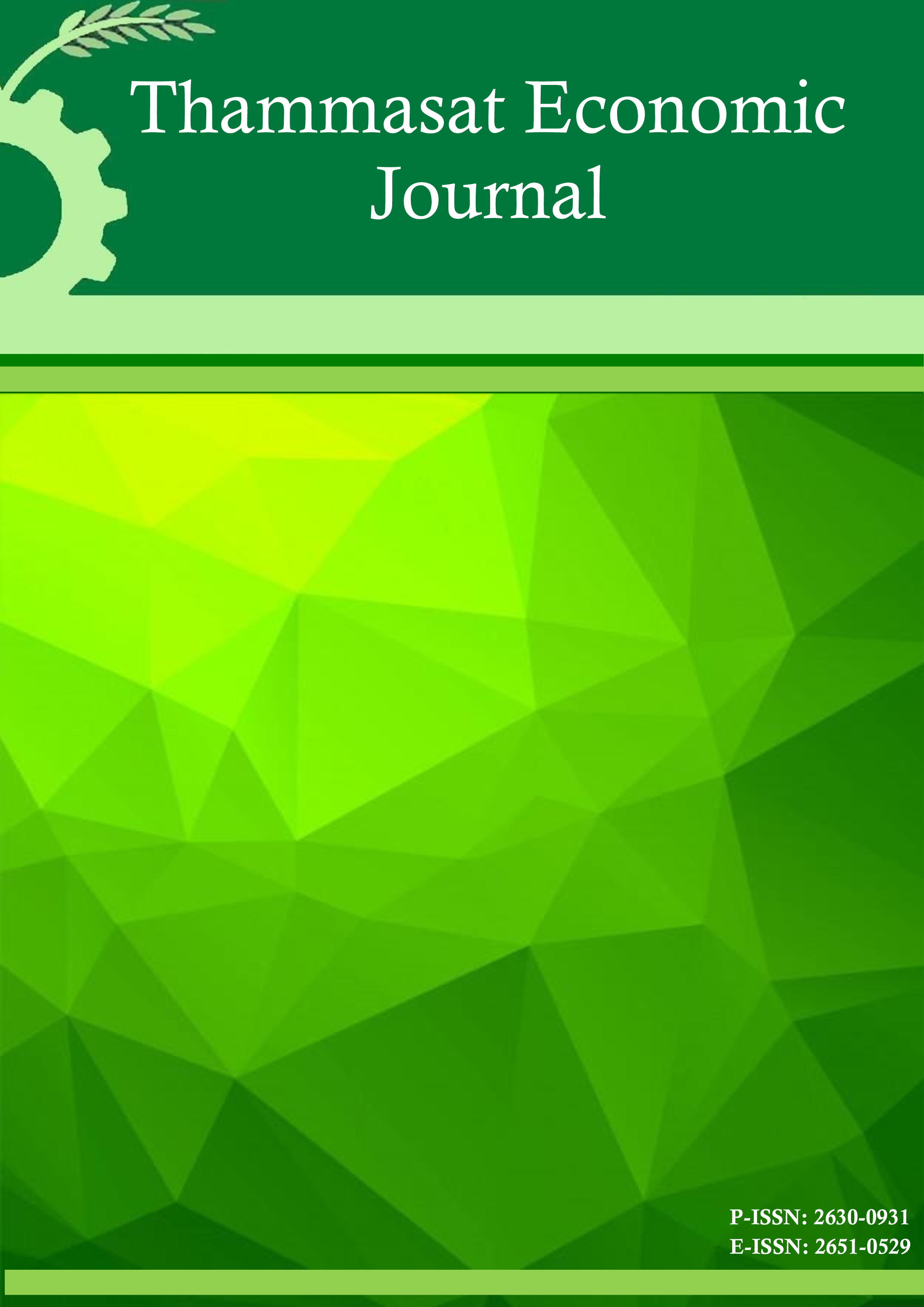การใช้และการเชื่อมต่ออินเตอร์เน็ตในประเทศไทย
คำสำคัญ:
Internet, Information and Communication Technology, Probit Analysis; Spill-over Effectบทคัดย่อ
ในปัจจุบันอินเตอร์เน็ตจัดว่าเป็นเทคโนโลยีสารสนเทศและการสื่อสารประเภทหนึ่งที่มีบทบาทสำคัญต่อการพัฒนาศักยภาพของบุคคลและการเจริญเติบโตทางเศรษฐกิจของประเทศ การทราบถึงพฤติกรรมการใช้และการเชื่อมต่ออินเตอร์เน็ตในระดับบุคคลและครัวเรือนจึงเป็นสิ่งจำเป็นสำหรับใช้ในการกำหนดนโยบาย งานศึกษานี้จึงมีวัตถุประสงค์เพื่อที่จะอธิบายถึงปัจจัยที่มีอิทธิพลต่อการตัดสินใจใช้อินเตอร์เน็ตของบุคคลและการเชื่อมต่ออินเตอร์เน็ตของครัวเรือนในประเทศไทย โดยใช้ข้อมูลสำรวจการมีการใช้เทคโนโลยีสารสนเทศและการสื่อสารในครัวเรือนปี พ.ศ. 2552 ของสำนักงานสถิติแห่งชาติ จากการวิเคราะห์ทางเศรษฐมิติด้วยแบบจำลอง Probit พบว่า อายุ การศึกษา รายได้ ที่ตั้งของครัวเรือน และประสบการณ์ในการใช้คอมพิวเตอร์ ส่งผลกระทบอย่างมีนัยสำคัญทางสถิติต่อแนวโน้มในการใช้อินเตอร์เน็ตของบุคคลและครัวเรือน นอกจากนี้ เป็นที่น่าสนใจว่าประสบการณ์ในการใช้อินเตอร์เน็ตของเด็กที่โรงเรียน โดยเฉพาะอย่างยิ่งสำหรับเด็กที่กำลังศึกษาอยู่ในระดับตั้งแต่มัธยมศึกษาตอนต้นขึ้นไปนั้นส่งผลทำให้แนวโน้มการเชื่อมต่ออินเตอร์เน็ตของครัวเรือนเพิ่มสูงขึ้น ผลการศึกษาเหล่านี้แสดงให้เห็นว่าในการกำหนดนโยบายหรือโครงการเพื่อส่งเสริมการใช้อินเตอร์เน็ตของประชากร ผู้กำหนดนโยบายควรให้ความสำคัญไปที่กลุ่มคนที่ด้อยโอกาสในการเข้าถึงเทคโนโลยีและอินเตอร์เน็ตมากขึ้น โดยเฉพาะอย่างยิ่งกลุ่มคนที่มีรายได้และการศึกษาไม่สูง และกลุ่มคนที่อยู่นอกเขตเมือง นอกจากนี้ การส่งเสริมการใช้อินเตอร์เน็ตโดยมุ่งเน้นไปที่เด็กและเยาวชนในสถานศึกษาเป็นสิ่งที่ควรสนับสนุน เพราะนอกจากจะเป็นการพัฒนาศักยภาพของเด็กและเยาวชนโดยตรงแล้ว ประสบการณ์การเรียนรู้ของเด็กจากสถานศึกษาก็ยังสามารถถ่ายทอดและแพร่หลายไปสู่สมาชิกคนอื่นในครัวเรือนด้วย
เอกสารอ้างอิง
2.Chinn, Menzie D., & Fairlie, Robert W. (2010). ICT Use in the Developing World: An Analysis of Differences in Computer and Internet Penetration. Review of International Economics(18), 153-167.
3.Gillett, Sharon E., & Sirbu, Marvin A. (2006). Measuring the Economic Impact of Broadband Deployment. Final Report submitted to the US Department of Commerce, Economic Development Administration. Retrieved from http://cfp.mit.edu/publications/CFP_Papers/Measuring_bb_econ_impact-final.pdf
4.Greene, William H. (1997). Econometric Analysis (International ed.). Upper Saddle River, New Jersey: Prentice-Hall.
5.Greenstein, Shane, & McDevitt, Ryan C. (2009). The Broadband Bonus: Accounting for Broadband Internet's Impact on U.S. GDP. NBER Working Paper Series. Retrieved from http://www.nber.org/papers/w14758
6.Gujarati, Damodar N., & Porter, Dawn C. (2009). Basic Econometrics (5th ed.). Singapore: McGraw-Hill..
7.Holt, Lynne, & Jamison, Mark. (2009). Broadband and Contributions to Economic Growth:Lessons from the US experience. Telecommunications Policy, 33, 575-581.
8.Horrace, William C., & Oaxaca, Ronald L. (2006). Results on the Bias and Inconsistency of Ordinary Least Squares for the Linear Probability Model. Economics Letters (90), 321-327.
9.International Telecommunication Union. (2010). Year Book of Statistics: Telecommunication/ICT Indicators 2000-2009. Geneva, Switzerland.
10.International Telecommunication Union. (2010). Measuring the Information Society. Geneva, Switzerland.
11.International Telecommunication Union. (2011). Measuring the Information Society. Geneva, Switzerland.
12.Koutroumpis, Pantelis. (2009). The Economic Impact of Broadband on Growth: A Simultaneous Approach. Telecommunications Policy, 33, 471-485.
13.Madden, Gary, & Coble-Neal, Grant. (2003). Internet Use in Rural and Remote Western Australia. Telecommunications Policy, 27, 253-266.
14.Mitra, Sugata, & Rana, Vivek. (2001). Children and the Internet: Experiments with Minimally Invasive Education in India. The British Journal of Educational Technology, 32(2), 221-232.
15.Mocnick, Dijana, & Sirec, Karin. (2010). The Determinants of Internet Use Controlling for Income Level: Cross-country Empirical Evidence. Information Economics and Policy, 22, 243-256.
16.Norris, Pippa. (2001). Digital Divide: Civic Engagement, Information Poverty, and the Internet Worldwide: Cambridge University Press.
17.Qiang, Christine Z. (2009). Telecommunications and Economic Growth. World Bank, Washington DC.
18.Qiang, Christine Z., & Rossotto, Carlo M. (2009). Economic Impacts of Broadband Information and Communications for Development: Extending Research and Increasing Impact. Wachington DC.: The World Bank.
19.Rappoport, Paul N., Taylor, Lester D., Kridel, Donald, & Serad, William. (1998). The Demand for Internet and On-line Access. In Erik Bohlin & Standford L. Levin (Eds.), Telecommunications Transformation: Technology, Strategy and Policy. Amsterdam: IOS Press.
20.Tengtrakul, Pitikorn, & Peha, Jon M. (2010). Spill-over Effects of ICT Use in School to Thai Communities. Paper presented at the 38th Telecommunications Policy Research Conference.
21.Tengtrakul, Pitikorn, & Peha, Jon M. (2011). Access to and Penetration of ICT in Rural Thailand. Telecommunications Policy, 35, 141-155.
22.World Bank. World Development Indicators. Retrieved August 3, 2011 http://databank.worldbank.org/ddp/home.do







